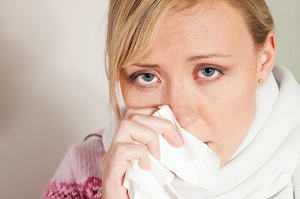
Symptoms
Colds typically display symptoms of coughing sneezing and congestion. Congestion can occur in the chest or the sinuses. You may also find this leads to wheezing, difficulty breathing and a runny nose. Different symptoms are associated with the flu, including; fever, achy muscles, chills, headache, exhaustion and loss of appetite. The flu will affect the stomach, intestines and the lungs. Most typically healthy people can continue to work through a cold although it may be a little uncomfortable. However, with the flu a few days off work are needed to get back to full health.
Prevention
Besides avoiding all contact with humankind, it’s difficult to guarantee you won’t get a cold or the flu during cold and flu season. There are measures you can take to help prevent contracting a virus or speed up your recovery. The best defence of the flu is to get a flu shot early on in the season. Some say the flu shot will make you sick and it is possible but the sickness you get from the shot is not as bad as getting the actual flu. Flu shots are especially important for children or seniors who have weakened immune systems. Proper hand washing is also extremely important during cold and flu season.
There are many ways to prevent catching a cold. Most include amping up your intake of vitamins and minerals. Vitamin C has often been touted as strong cold combatant. Vitamin C helps to boost your immune system so you’re more readily able to fight off the virus. Echinacea is another supplement when known ability to prevent the common cold. Hand washing, disinfecting and teaching those around you to cough and sneeze into a tissue can also prevent the spread of the virus.
Treatment
Unfortunately there is very little that can be done to treat the flu. Medication can be taken to reduce or break a fever and to help ease the discomfort of achy muscles. It’s also important to drink plenty of fluids including water, orange juice and ginger ale. Avoid drinking sugary or caffeinated drinks. It’s difficult to eat when you have the flu but soups are good to help add nutrition and rehydrate the body. The best treatment for the flu is rest and fluids. If symptoms last for more than two days contact a doctor.
A cold will last on average 2-5 days. Although you may not be able to speed up your recovery there are medications that you can take to relieve the symptoms to help you function normally. Antihistamines and decongestants will help ease inflammation in your airways. Expectorants help to suppress a cough and can ease respiratory problems by dissolving mucus. For a more natural remedy zinc supplements can shorten the duration of the common cold.
Don’t get caught unprepared during cold and flu season. Know the difference between the two and how to treat them so you’ll be ready with the season rolls through.
For more articles go to http://lifesportfitness.lifestyleezine.com
